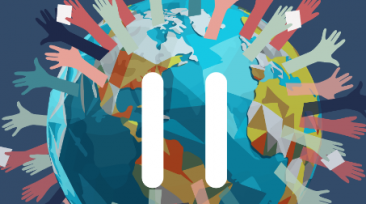Participatory TV Journal N°1: The game-changing elections

Our first Journal TV Participatif (JTvP), which was held on March 30th 2023, enabled GEAB readers to meet up in order to discuss the news and share their feedback about an article released in our March issue: The calendar of future events – a special focus on elections 2023/2024.
An overview of current news
The brand-new concept aims to be the embodiment of a plural, multinational, and multilingual information system, which seems essential to face the future serenely. Through the active participation of our subscribers, it allows everyone to appreciate a diversity of points of view on current events. From the Second International Forum on Democracy organised by China to Saudi Arabia’s official membership to the Shanghai Cooperation Organisation, the creation of the Balkans QUAD, the warning about dangers regarding innovations in the AI field, as well as the victory of Farmer-Citizen Movement as a result of the latest provincial elections in the Netherlands, here is an overview of our first participatory tv journal.
The Second International Forum on Democracy[1] was mentioned, followed by the Forum of the Chinese Academy of Social Sciences, held in Beijing on 23 March. The United States used to be the flagship of democracy as leader of the free world, but China plans to start embodying a reinvention of political models in a context of Western democracy crisis.
Another highlight shows Saudi Arabia becoming an official member of the Shanghai Cooperation Organisation (SCO).[2] This event keeps challenging the traditionally close relationship between Saudi Arabia and the United States framed by the USS Quincy (CA-71, also known as the Quincy Pact). It occurs in the context of the US-Saudi distancing, but also after the announcement of a historic Saudi-Iran rapprochement influenced by China.[3] Despite the fact that it looks like pivoting towards the East, Saudi Arabia is far from breaking ties with the United States but is instead undertaking a diversification of its relationships. This further indicates that a return to a bipolar world is less likely than an intensification of the multipolar dynamic.
On 29 March, the Balkans QUAD[4] has been created by four Balkan states: North Macedonia, Albania, Kosovo, and Montenegro. Its purpose is to make its members’ foreign and security policy openly align with the one of the European Union. Those states are presently candidates. Still, their membership drags in the long run, especially for Montenegro and North Macedonia, which requested to join the EU in 2008 and 2004 respectively. The creation of the Balkans QUAD appears as a new way of joining the organisation.
In terms of innovation, as demonstrated in the latest GEAB bulletin, it is no longer systematically associated with progress in the West. The exponential pace of all kinds of innovation makes it difficult to adapt to changes. This observation is backed by the involvement of Tech CEOs, including Elon Musk, who are urging for a break in the frenzied innovations regarding AI.[5] In an open letter, they argue that AI represents ‘profound risks to society and humanity’ to some extent. A petition is currently circulating for this break to take effect.
Finally, fresh news linked to the Calendar of future events mentions the latest provincial elections in the Netherlands.[6] The Farmer-Citizen Movement (Dutch: BoerBurgerBeweging, BBB) emerged as favorites and even won and caused the government’s loss of majority in the Senate. The movement is the voice of farmers’ anger against climate policies enforced by a more urban political class.
The calendar of future events – a special focus on elections 2023/2024
The conversation then focused on the calendar of upcoming elections (2023/2024) published in the bulletin of March.[7] It represents an unprecedented crucial deadline, as nearly one-third of the world’s population will be called to the polls. This event was a great opportunity to exchange with GEAB readers about cases like Turkey, Taiwan and Mexico.
Despite hopes for an international scene renewal, there is a high chance of numerous re-elections. The cases of Modi and Ramaphosa[8] are instantly evoked, as they are both favorites in India and South Africa. Their re-election, however, and the future of their states’ foreign policy would depend mainly on coalition issues. If their coalitions hold on, no political opponents will be able to challenge them.
The Russian issue was widely analysed and making any prediction for the next presidential election scheduled for spring 2024 is far from easy. The question remains whether Putin will succeed in staying in power or not. The Kremlin aims to hold the elections in the occupied regions of Ukraine, which would seriously affect the conflict that has been ongoing since 2014.
Regarding the European Union, the various elections in Bulgaria, Finland, Greece, Slovakia, Poland, and Spain, planned for 2023, will give a foretaste of the European Parliament elections scheduled for May 2024. Should an escalation of exacerbated nationalism with a strengthening of far-right political parties be expected? Will a new record of abstention be broken? More than ever, the European Parliament elections will be the echo chamber of the regional and national crises of the Old Continent. The risk is that they could be spread throughout the European institutions.
The United States presidential elections of late 2024 will conclude the worldwide electoral timeframe. Only one official Democratic candidate has been announced so far, while several Republican candidates are already known.[9] Biden and Trump are both eligible for a second term. Although his candidacy remains unofficial, Biden will have to find a way to achieve peace between Russia and Ukraine, if he wants to succeed in tilting the balance in his favor. Regarding Trump, his trial for a bribery case is pending. However, like in the European elections, the economic and social issues specific to each federal state will determine the vote outcome.
See you soon for our JTP #2 planned for 27 April (open registration here).
____________
[1] Source: PR Newswire, 27/03/2023
[2] Source: Reuters, 29/03/2023
[4] Source: Euractiv, 30/03/2023
[5] Source: Reuters, 29/03/2023
[9] Source: Ballotpedia




Comments